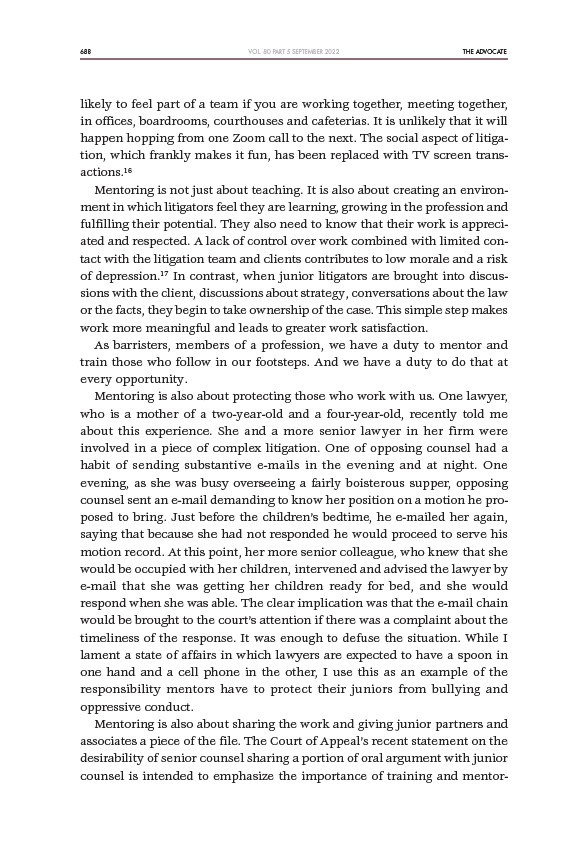
688 THE ADVOCATE
VOL. 80 PART 5 SEPTEMBER 2022
likely to feel part of a team if you are working together, meeting together,
in offices, boardrooms, courthouses and cafeterias. It is unlikely that it will
happen hopping from one Zoom call to the next. The social aspect of litigation,
which frankly makes it fun, has been replaced with TV screen transactions.
16
Mentoring is not just about teaching. It is also about creating an environment
in which litigators feel they are learning, growing in the profession and
fulfilling their potential. They also need to know that their work is appreciated
and respected. A lack of control over work combined with limited contact
with the litigation team and clients contributes to low morale and a risk
of depression.17 In contrast, when junior litigators are brought into discussions
with the client, discussions about strategy, conversations about the law
or the facts, they begin to take ownership of the case. This simple step makes
work more meaningful and leads to greater work satisfaction.
As barristers, members of a profession, we have a duty to mentor and
train those who follow in our footsteps. And we have a duty to do that at
every opportunity.
Mentoring is also about protecting those who work with us. One lawyer,
who is a mother of a two-year-old and a four-year-old, recently told me
about this experience. She and a more senior lawyer in her firm were
involved in a piece of complex litigation. One of opposing counsel had a
habit of sending substantive e-mails in the evening and at night. One
evening, as she was busy overseeing a fairly boisterous supper, opposing
counsel sent an e-mail demanding to know her position on a motion he proposed
to bring. Just before the children’s bedtime, he e-mailed her again,
saying that because she had not responded he would proceed to serve his
motion record. At this point, her more senior colleague, who knew that she
would be occupied with her children, intervened and advised the lawyer by
e-mail that she was getting her children ready for bed, and she would
respond when she was able. The clear implication was that the e-mail chain
would be brought to the court’s attention if there was a complaint about the
timeliness of the response. It was enough to defuse the situation. While I
lament a state of affairs in which lawyers are expected to have a spoon in
one hand and a cell phone in the other, I use this as an example of the
responsibility mentors have to protect their juniors from bullying and
oppressive conduct.
Mentoring is also about sharing the work and giving junior partners and
associates a piece of the file. The Court of Appeal’s recent statement on the
desirability of senior counsel sharing a portion of oral argument with junior
counsel is intended to emphasize the importance of training and mentor-